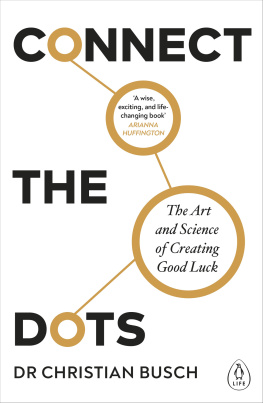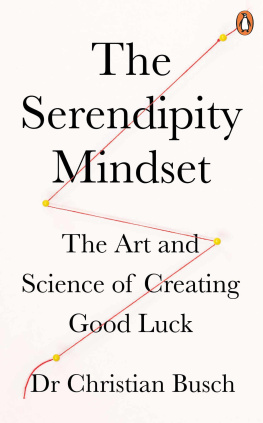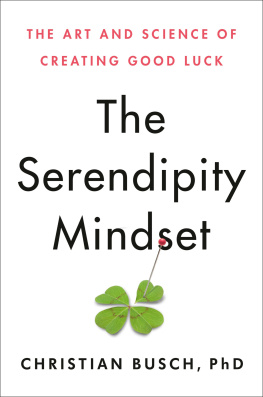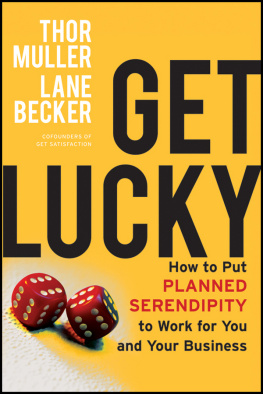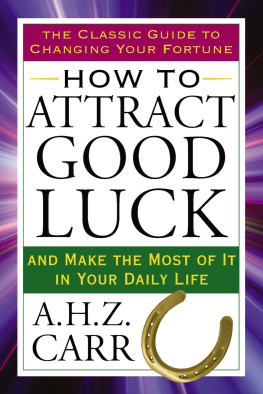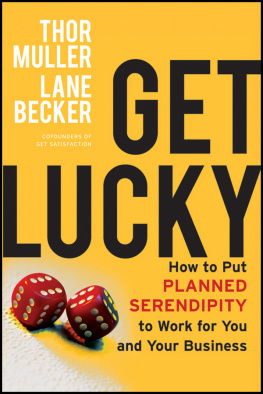Dr Christian Busch
CONNECT THE DOTS
The Art and Science of Creating Good Luck

PENGUIN BOOKS
UK | USA | Canada | Ireland | Australia
India | New Zealand | South Africa
Penguin Books is part of the Penguin Random House group of companies whose addresses can be found at global.penguinrandomhouse.com.

First published as The Serendipity Mindset 2020
Published with new material as Connect the Dots 2022
Copyright Christian Busch, 2020, 2022
The moral right of the author has been asserted
ISBN: 978-0-241-54243-9
This ebook is copyright material and must not be copied, reproduced, transferred, distributed, leased, licensed or publicly performed or used in any way except as specifically permitted in writing by the publishers, as allowed under the terms and conditions under which it was purchased or as strictly permitted by applicable copyright law. Any unauthorized distribution or use of this text may be a direct infringement of the authors and publishers rights and those responsible may be liable in law accordingly.
For my dear parents Ulla and Rainer, whose love, kindness and resilient optimism have provided me with inspiration throughout my life
Introduction
Im always surprised when I see people who have been successful and theyre absolutely convinced that its all because they were so smart. And Im always saying, well, I worked hard, and Ive got some talent, but there are a lot of hardworking, talented people out there There was this element of chance to it of serendipity [and] you want to see if you can maybe figure out how to sprinkle that stardust on other people.
Barack Obama, 44th President of the United States of America
We all like to feel like we are masters of our own destiny to be in control of our future, to know how we will reach our goals and ambitions. In short, we all like to have a plan.
This seemingly innate human desire to map out our future is reflected in almost every aspect of modern life. Organizations, governments and every one of us all structure our activities around plans, strategies and targets that we make. We construct routines, rules and processes from setting the alarm clock to organizing national elections to ensure that those plans come to fruition.
But are we really in control of our lives? Despite all of our planning, modelling and strategizing, there appears to be another factor at work: the unexpected. In fact, unforeseen events, chance meetings or seemingly bizarre coincidences are not just minor distractions or specks of grit in our well-oiled lives. The unexpected is often the critical factor, it is the force that makes the greatest difference to our lives and our futures.
Perhaps, if you have one, you met your spouse by coincidence? Or came across your new job or new flat by accident? Did you meet your future co-founder or investor by chance? Or did you randomly pick up a magazine just to find exactly what you needed to know to solve a problem? How did such moments, big or small, change your life? How might your life have played out had everything just gone according to plan?
Wars are won or lost, companies thrive or collapse and love is found or lost all on the turn of the unexpected. Whatever our ambitions in life, whether finding business success, love, joy, or spiritual meaning, we are prone to coincidental encounters. The most mundane moment, like running into someone in the gym, can change your life.
Even in the rigorous world of scientific research, the power of the unexpected is (almost) always at play. Studies suggest that around 30 to 50 per cent of major scientific breakthroughs emerge as the result of accidents or coincidences: one chemical spills into another, cells combine in dirty Petri dishes, or there is a chance encounter between experts whose incidental conversation sparks new insights. The greatest opportunities, for individuals and organizations alike, are often a matter of serendipity.
So, does most success boil down to blind luck to success or failure brought simply by chance rather than through our own actions? No; intuitively we sense that this isnt true either. While we recognize that the greatest turning points and transformative opportunities in our lives often seem to occur by chance, some people just seem to have more luck, and subsequently more success and joy, than others.
This isnt just a modern phenomenon, either; the chemist and biologist Louis Pasteur thought that chance favours the prepared mind. The military leader and emperor Napolon Bonaparte said he would rather have lucky generals than good ones and the Roman writer and statesman Seneca believed that luck is a matter of preparation meeting opportunity.
Their beliefs all reflect the idea that, while chance is a real force, there is more to life than blind luck. Indeed, the word fortune can refer to both success and luck. Even commonplace phrases such as: You make your own luck or Hes a man with an eye for the main chance all point to the idea that success in life depends on an interaction a synthesis between pure chance and human effort.
What is really going on here? Are some people able to create the conditions for positive coincidences to happen more often than others? Are they better able to spot and grasp these moments and turn them into positive outcomes? Can our education and approach to work and life equip us with the most important skill of all the ability to navigate the unexpected and make our own smart luck?
This is a book about the interactions of coincidence, human ambition and imagination. It is a book about serendipity. This can best be defined as unexpected good luck resulting from unplanned moments in which proactive decisions lead to positive outcomes. Serendipity is the hidden force in the world, and it is present all around us, from the smallest day-to-day events to life-changing, and sometimes world-changing, breakthroughs.
However, only few of us including many of the people you will meet in this book have deciphered this code and developed the mindset needed to turn the unexpected into a success and a force for good. Once we realize that serendipity is not just about a coincidence that just happens to us but is actually the process of spotting and connecting the dots do we start to see bridges where others see gaps. Only then does serendipity start happening all the time in our lives.
When this happens, the unexpected changes from being a threat to a constant source of joy, of wonder, of meaning and of sustained success. In a world that has been running on a fight-or-flight lizard brain, in which fear-mongering, populism and uncertainty have taken over, the mindsets and contexts that we are used to are simply not working any more. Developing a serendipity mindset and shaping the related conditions become the essential life-skills and capabilities for ourselves, our children and our organizations.
Imagine a world driven by curiosity, opportunity and a sense of connection, rather than by fear, scarcity and jealousy. A world in which enormous challenges such as climate change and social inequality are being tackled by solutions that are bold and up to the challenge. In our fast-changing world, many of the emerging problems are so complex that much of our future will be driven by the unexpected. Developing a serendipity mindset is therefore an evolutionary necessity as well as an opportunity to identify what makes us feel most alive so that we can develop a deeper enthusiasm for life.

